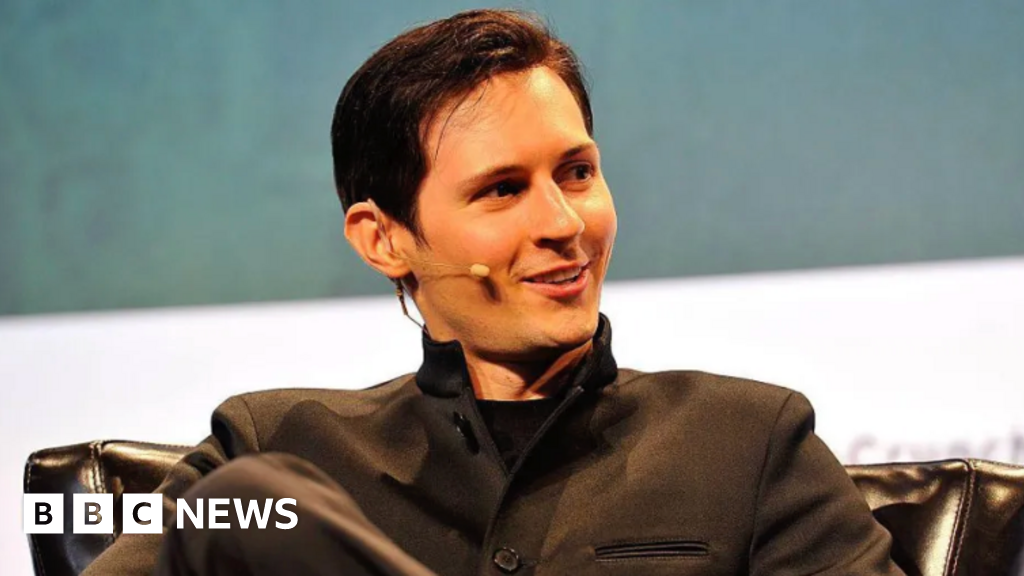The BBC has learned that Telegram – the messaging app service whose boss has been arrested in France – refuses to join international programmes aimed at detecting and removing child abuse material online.
The app is not a member of either the National Centre for Missing and Exploited Children (NCMEC) or the Internet Watch Foundation (IWF) – both of which work with most online platforms to find, report and remove such material.
It comes as the founder and chief executive of the app – which has more than 950 million registered users – remains under investigation in France.
Billionaire Pavel Durov has been detained over alleged offences relating to a lack of moderation on the platform.
According to officials the 39-year-old is accused of failure to co-operate with law enforcement over drug trafficking, child sexual content and fraud.
Telegram says it proactively moderates harmful content on its platform including child abuse material. The company insists that its moderation is “within industry standards and constantly improving”.
However, unlike all other social networks, it is not signed up to programmes like NCMEC’s CyberTipline which has more than 1,600 internet companies registered.
US-based firms are legally required to sign up but 16% of the companies who participate are not based in the US.
Telegram is based in Dubai, where Mr Durov lives.
The vast majority of child sexual abuse material reports came from tech giants and social networks including Facebook, Google, Instagram, TikTok, Twitter (X), Snapchat and WhatsApp.
The BBC understands that NCMEC has repeatedly asked Telegram to join to help tackle child sexual abuse material (CSAM) but it has ignored requests.
Telegram also refuses to work with the Internet Watch Foundation, which is the UK’s equivalent of NCMEC.
An IWF spokesperson said: “Despite attempts to proactively engage with Telegram over the last year, they are not members of the IWF and do not take any of our services to block, prevent, and disrupt the sharing of child sexual abuse imagery.”
By not being an active part of IWF or NCMEC, Telegram is not able to proactively find, remove or block confirmed CSAM which is categorised and added to lists compiled by the charities.
IWF said that the company did remove CSAM once material was confirmed but said it was slower and less responsive to day-to-day requests.
The BBC contacted Telegram for comment about its refusal to join the child protection schemes and received a response after publication which has been included.
Telegram is also not a part of the TakeItDown programme that works to remove so-called revenge porn.
Snap, Facebook, Instagram, Threads, TikTok, Pornhub and OnlyFans are all members of the scheme that uses a so-called hash list to scan for images and videos on their public or unencrypted platforms.
Another norm that Telegram does not conform to in the usual way is Transparency Reporting.
Every six months social networks publish a list of all the content taken down because of police requests.
Most other social networks including Meta’s apps, Snapchat and TikTok publish their reports online with previous years in a library to refer to.
Telegram has no such website and only a channel on the app with no library history of transparency reports. It also describes its approach to Transparency Reports as “semiannual”.
The Telegram Transparency channel did not reply to a request to see previous reports and said that there was “no report available for your region”.
Telegram also has an unusual system for media in general. The contact method is through an automated bot on the app.
This reporter has not had a reply in the months of trying to get a response to various requests. A reply was sent to this article but the press team did not respond to follow up questions.
In June Pavel Durov told journalist Tucker Carlson that he only employs “about 30 engineers” to run his platform.
Mr Durov, who was born in Russia and now lives in Dubai, has citizenship in Russia, France, the United Arab Emirates and the Caribbean island nation of St Kitts and Nevis.
Telegram is particularly popular in Russia, Ukraine and former Soviet Union states as well as Iran.

